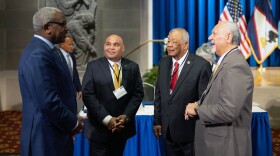ST. CROIX — A judge denied the plaintiffs’ request for a temporary restraining order to prevent Board of Elections Chair Raymond Williams from holding meetings during a hearing Friday in Superior Court on St. Croix and dismissed the civil complaint submitted Tuesday by three BOE members and a former senatorial candidate.
READ MORE: BOE members, former senatorial candidate seek TRO to stop Raymond Williams from chairing meetings
The plaintiffs broadened their request in court to completely remove Williams from his elected position as a BOE member, which his attorney noted can only occur through a recall election in accordance with the Revised Organic Act.
Collister Fahie, one of the plaintiffs who unsuccessfully ran for a Senate seat in the St. Thomas/St. John District during the 2024 election, represented himself in person in the courtroom and the three other plaintiffs — BOE members Lawrence Boschulte (vice chair) and his wife, Atanya Springette, and Harriet Mercer, all of whom participated virtually. In presenting their case, Fahie called the three other plaintiffs as witnesses but only two of them — Springette and Mercer — were able to turn on their cameras to take the oath and respond to questions. Boschulte, who is suing in the TRO complaint to mandate virtual meetings, deferred to Mercer when Fahie called him as a witness. Fahie later told the court that Boschulte had a technical issue appearing on the screen.

Judge Alphonso Andrews Jr., who heard the case that was filed in the St. Thomas/St. John District after two judges in that district recused themselves, suggested apparent “deep infighting” among board members that he noted is unrelated to what he described as the crux of the plaintiffs’ complaint — a conflict-of-interest claim. He said the plaintiffs simply are not happy with the way Williams runs the board.
“That is not an issue for this court,” he said.
Andrews said it must be understood that the board, not the court nor the public, chose Williams to serve as its chair. He pointed out Mercer’s testimony, during which she stated board members do not listen to each other. He suggested that more listening and having mutual respect would serve as a starting point to resolve the conflict.
“I think voters who put you there would expect nothing less,” he said.
Andrews found that the plaintiffs failed to introduce any evidence to support four other counts outlined in their complaint — conspiracy to include an allegation that Williams violated the Sunshine Law by not allowing the public to attend standing committee meetings; abuse of authority under the color of law to include an allegation that Williams denied board members to attend meetings virtually; violation of constitutional rights to equal protection, due process, and free association to include an allegation that Williams failed to uphold elections laws under Title 18 of the Virgin Islands Code; and fraud to include an allegation that Williams intentionally paid an unqualified employee at VI Lottery.
Assistant Attorney General Christopher Timmons, Civil Division chief, represented Williams for the limited purpose of contesting personal jurisdiction and opposing the TRO.
“We’re pleased with the result,” Timmons said after the hearing. “I think it was the right decision.”
Timmons said the conflict-of-interest statute requires a public official to gain some benefit by virtue of their position, noting the plaintiffs did not present any evidence that Williams gained anything by virtue of his position as a BOE member.
During the hearing, Andrews asked Fahie to explain what “irreparable harm,” an element for a TRO, Williams’ conduct caused.
“The irreparable harm is that the board does not function,” he said.
When asked by the court for specifics about the violation the plaintiffs claimed constituted harm, Fahie said that Williams conducts board meetings without a quorum. Williams, the only witness Timmons called to the stand, testified that the board needs an eight-member majority to act. He said when the board originally operated as a Joint Board of Elections, a quorum required a majority inclusive of three members from each district.

Under cross examination by Fahie, Williams further explained that only a majority of board members is required to establish a quorum since there is now a single Board of Elections. Timmons informed the court that the requirement to have three board members from each district to establish a quorum was linked to the former Joint Board of Elections, noting that statute has since been repealed. During the hearing, Timmons repeatedly objected to questions Fahie asked his witnesses and fellow plaintiffs on the grounds of leading, relevance, and requiring a legal conclusion.
In addressing claims that Williams violated the Sunshine Law by not permitting the public to attend standing committee meetings, Timmons clarified that the statute only applies to the full board that has the authority to act on matters.
The conflict-of-interest claim related to Williams’ ability to serve on the BOE given his appointments as both a member of the Public Services Commission and executive director of the Virgin Islands Lottery, both of which are autonomous agencies that operate independently from the executive branch.
After reading the conflict-of-interest statute, Andrews noted the “broad” language made it difficult to establish that a substantial conflict existed. He also noted another statute plaintiffs relied on to make their case that outlined the duties of the VI Lottery director, specifically prohibiting involvement in any other “occupation” or “profession.” After reviewing both definitions in Black’s Law Dictionary, Andrews found that the plaintiffs did not present any evidence suggesting Williams was in violation of the statute.
After the judge’s ruling as it pertains to the conflict-of-interest laws, Fahie said it would have been an understatement to say he was surprised.
“After he looked at it and he realized that, based on his interpretation of it, the level of how broad, remember, it is the same overbroad reason why I decided to take it to the courts, and the court agrees it’s broad, but it is because it is that broad that it doesn’t rise to the level of conflict of interest that we are seeking,” he said. “And so again, we have to live with that order from the court.”















